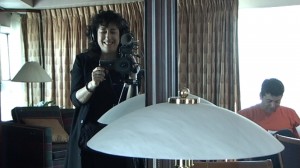Director’s Statement
 I met Namkhai Norbu Rinpoche in 1985 when I was 25 years old. At age 28, I took a much needed hiatus from filmmaking to travel with him on and off for four years as his secretary. During that time, I began to film his everyday life—his family and his teaching—from an insider’s perspective. In 1992, I went back to work to make my next film and put aside the early footage of Rinpoche. Even though I kept filming him over the years, I didn’t feel I had enough of a story to make a film, and I questioned how to convey the spiritual on film. After many requests from the Dutch Buddhist Film Foundation to continue this film, I finally agreed to face making something out of the film again years later, in the new millennium. At his age, I knew there weren’t many years left to tell Namkhai Norbu’s story, nor would he allow another filmmaker inside his private life and family. It was clear I was the only one who could make a film about him.
I met Namkhai Norbu Rinpoche in 1985 when I was 25 years old. At age 28, I took a much needed hiatus from filmmaking to travel with him on and off for four years as his secretary. During that time, I began to film his everyday life—his family and his teaching—from an insider’s perspective. In 1992, I went back to work to make my next film and put aside the early footage of Rinpoche. Even though I kept filming him over the years, I didn’t feel I had enough of a story to make a film, and I questioned how to convey the spiritual on film. After many requests from the Dutch Buddhist Film Foundation to continue this film, I finally agreed to face making something out of the film again years later, in the new millennium. At his age, I knew there weren’t many years left to tell Namkhai Norbu’s story, nor would he allow another filmmaker inside his private life and family. It was clear I was the only one who could make a film about him.
There was also another change on the horizon. When I filmed Rinpoche starting in 1988, I also began filming his son Yeshi as well, starting from age 18. Although it was common knowledge that Yeshi was the reincarnation of Namkhai Norbu’s uncle, a great Buddhist master, he adamantly resisted the idea, and wanted to be left alone to live a normal life. I remember in 1989, I was so excited by the natural drama of Yeshi’s story that one day when we were walking together in Rome, I discussed the potential of filming him returning to Tibet to the monastery of his reincarnation and the people waiting for him since his birth. He was emphatic: “You can film as long as you like but it will never happen. I will never go back to the monastery in Tibet.” He said. I believed him. The years passed, and I continued to film Yeshi, with his growing family and business career, as he intersected with his father’s life, never expecting that anything would change. But in the millennium, his story took an amazing new turn.
With the developments and changes in this father-son relationship, a unique story developed about cultural survival in exile that demonstrated the value of this rare spiritual tradition. My aim is not to show Namkhai Norbu’s saintliness (nor his son’s) but both men’s essential, profound humanity and the profound and irreplaceable tradition that they embody as one-man inches towards maturity and the other inches towards his inevitable death.
Now is a crucial moment for Tibet, as the last of the great non-monastic Tibetan trained reincarnate teachers (called “Rinpoche”) remain alive; if we don’t capture some of their true spiritual heritage now—more than just a few esoteric scenes, but a living tradition—it will be lost forever.
—Jennifer Fox

